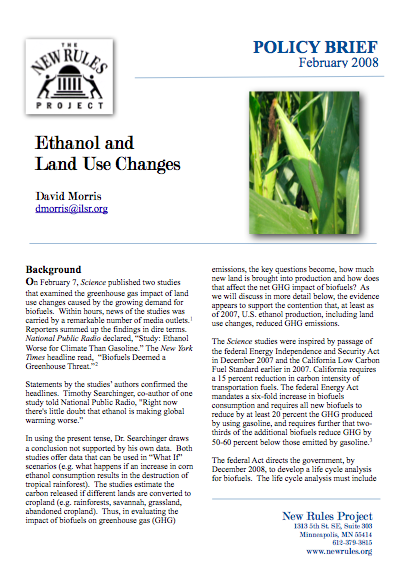For Immediate Release
PRESS RELEASE
CONTACT: 612-276-3456
GIVING THE MONEY BACK CAN LEAD TO AN EFFECTIVE CARBON CAP
Carbon caps with universal dividends create an ethical, equitable and politically effective climate policy
Minneapolis, Minn.– (February 12, 2008). Common to many proposals addressing climate change is a carbon cap – limiting and lowering global warming emissions over time. A cap will generate a market value for carbon allowances (permits) that could conservatively be $50 billion to $200 billion per year at the national level. A key issue is who will receive this value.
All or most of this money should be given back to consumers in the form of a per capita dividend or rebate, argues a new policy brief by the Institute for Local Self-Reliance (ILSR). “The sky belongs to all of us and we should all share equally in the new value that’s created by a carbon cap,” said ILSR senior researcher, John Bailey.
A cap on carbon will raise the price of energy and energy intensive goods and services. A universal dividend will help all households absorb and manage those cost increases. In particular, low and middle-income households, on average, should receive back more in dividends than they pay in higher prices for fuels and products.
“Using universal dividends can help hold tens of millions of households harmless while we make the transition to a low-carbon economy under a carbon cap,” according to Bailey. The idea of using universal dividends should be a key component of the carbon cap discussions going on in Congress and in various states, including Minnesota.
From a political perspective, universal dividends are critical. A major stumbling block to enactment of a carbon cap will be higher prices and that could fuel widespread resistance to what will be described as a major new and regressive energy tax. A per capita dividend overcomes this and will provide the time needed for energy saving technologies and low carbon fuels to expand in the marketplace.
The full report, Carbon Caps With Universal Dividends: Equitable, Ethical & Politically Effective Climate Policy, can be viewed online.
About ILSR: The Institute for Local Self-Reliance is a nonprofit organization founded in 1974 to advance sustainable, equitable, and community-centered economic development through research and educational activities and technical assistance. More at http://www.ilsr.org



